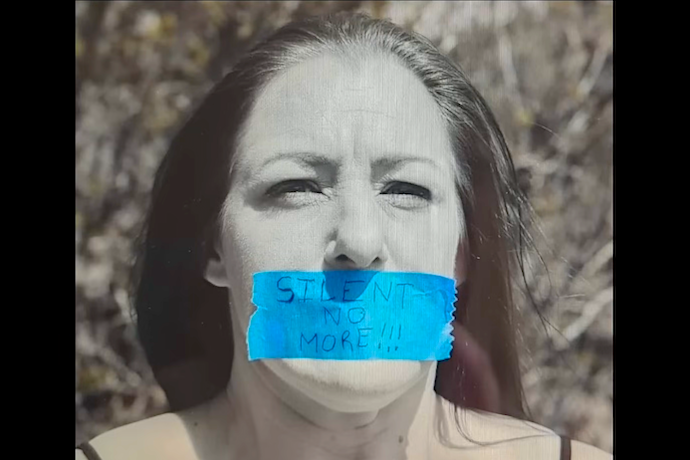Being of voting age in an American presidential election year is messy business. This has always been the case. A two-party system often means choosing the lesser of two evils—deciding which of one’s deeply-held beliefs are nonnegotiables and which can be set aside in favor of “good enough.”
Such is the dilemma facing many White evangelical women in America, whose usual guiding principles—anti-abortion, pro-“religious freedom,” anti-immigration—are chafing against what numerous publications, from the New Republic to Ms. to the Atlantic have called “the war on women” being waged by the Republican Party in general and the Trump campaign in particular. (Of course, one might argue that many of the earnest political beliefs shared by evangelical women actually stem from these same misogynistic roots—but we’ll come back to that later.)
These women and their progeny are Kristin Kobes Du Mez’s mission field.
Du Mez, both a practicing Christian and a scholar of American evangelicalism (not to mention, full disclosure, an occasional contributor to RD), has spent the past few years fielding waves of public responses to her book, which has been a breakout success (how often can academics say that?), Jesus and John Wayne: How White Evangelicals Corrupted a Faith and Fractured a Nation. A political and cultural history of White evangelicals’ obsession with male control and female submission, Jesus and John Wayne drew stark parallels between so-called biblical patriarchy and the militant masculinity of the American political rightwing. To Du Mez’s surprise, some evangelical women readers met the book with a mix of praise and resignation.
“‘It’s too late for us,’” Du Mez recalls them saying. “‘We’ve made our choices, and we can’t walk away from the lives we’ve made. But we want something different for our daughters.’”
Enter Du Mez’s newest venture, a documentary short produced with filmmaker Carl Byker. For Our Daughters, which has been available to stream for free on YouTube and the film’s website since its September 26 release, is a 29-minute distillation of the human fallout of the political and theological realities detailed in Jesus and John Wayne. But it’s also a sort of love letter to conservative evangelical women; part remonstration and part reminder that it’s not too late.
The documentary treads some of the same ground as the book that inspired it (Du Mez says she sees the two as companion pieces), but it homes in on the stories of sexual abuse—and their cover-ups within the Southern Baptist Convention and beyond—that demonstrate the human cost of a theology that encourages male control over women with few caveats.
Among those featured are Christa Brown, who began writing publicly in 2006 about her own abuse at the hands of Southern Baptist Convention-affiliated pastor Tommy Gilmore, sparking a wave of other women to step forward with their own stories of sexual abuse in the church. It would take until 2022 for Brown and her fellow agitators to see the SBC finally publish its formerly secret “database” of alleged abusers within the organization—a decision most likely spurred by the Houston Chronicle and San Antonio Express-News’s bombshell 2019 investigation revealing over 700 victims of sexual abuse within the SBC over the past two decades.
To Brown, the sway evangelical faith leaders have over the power brokers of the Republican Party spells sure disaster.
“When people talk about turning the US into a Christian nation, it makes me quake to ponder what that would mean for women in this country,” Brown says in For Our Daughters. “Because I have seen what it means for the largest evangelical Protestant faith group in the country, and it is bloody awful.”
Therein lies one of the key takeaways from Du Mez’s new documentary: outsiders, be warned—the vision shared by militant Christian patriarchs doesn’t stop at subjugating the women in their own community.
“We thought it was important to [listen to the] women themselves who have experienced what this system of authority and submission looks like when things go wrong inside churches,” Du Mez told Religion Dispatches. “To have them speak to a wider population, to Christians and to all Americans, to say, as Christa Brown says, these are not the men that you want in charge of this country.”
How far the documentary will reach beyond the sphere of those already familiar with the SBC’s exploits remains to be seen—indeed, non-Christians might find the film’s preoccupation with reclaiming a more liberatory approach to Christian gender power dynamics a bit alienating. Regardless, Du Mez is clear about her true target audience: women still operating within conservative evangelicalism. After all, they are the ones who must reckon with the fact that the call is coming from inside the house.
Granted, the documentary doesn’t say this as explicitly as some would like. While Du Mez and her interviewees have made clear elsewhere the ties between Christian patriarchy, Christian nationalism, White nationalism, and a whole host of conservative political platform items, they don’t get too specific here. Project 2025, a prime example of what happens when Christian nationalists get in bed with rightwing politicians, goes unmentioned in the film, which also issues no explicit political calls to action. Those hoping to see Du Mez’s target audience be challenged on the ways their own political beliefs are ideologically inextricable from the nativism, sexism, and Christian supremacy that rankles them when it goes “too far” will have to seek out a different source.
For Du Mez, it was important to give her viewers space to draw their own conclusions. “It may be that not every Christian woman who views the film agrees with every point, or agrees with every aspect of its framing,” Du Mez said. “But I have such faith in the power of these survivors’ voices. I just want them to listen to the stories and then do with it what they will.”
Evangelical women looking for next steps after watching the film won’t be left high and dry; the film website’s FAQ section ends with a few not-so-subtle suggestions. For one, viewers can “offer to help women in [their] church register to vote online.” Another tip? “Remind women that their vote is private and no one can ‘figure out’ who they voted for.”
Remember, despite all the pre-election noise about White evangelical women abandoning Trump in 2020, 70% of them still voted for him. Any meaningful dent in that number could swing an entire election.





